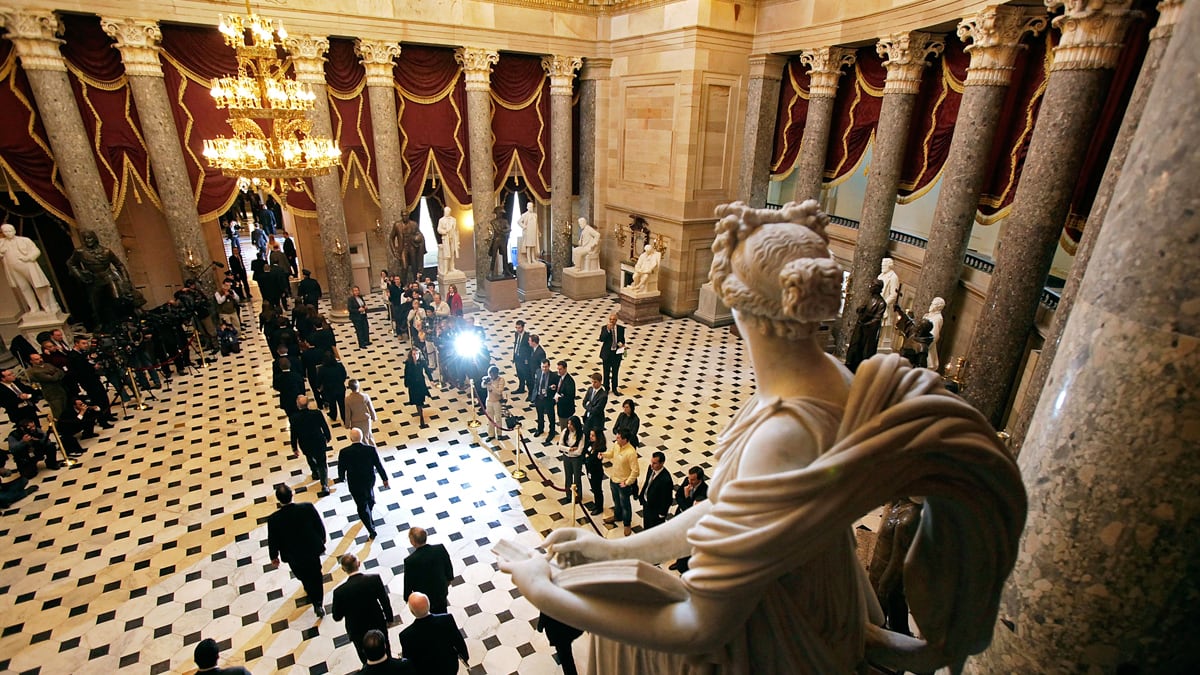Encouraged by near universal disgust with both Republicans and Democrats, prominent activists hope to organize a credible third-party alternative for the upcoming presidential campaign. The ambitious outfit Americans Elect has reportedly raised between $20 million and $30 million and secured ballot positions in 10 states for its proposed bipartisan ticket—with a presidential candidate from one major party and vice presidential nominee from the other. Most important, polling data consistently shows powerful public yearning for new electoral alternatives: a majority of respondents told Gallup we need a third party next year and a staggering 81 percent expressed dissatisfaction with the current performance of our federal government.
This mounting passion to escape the confines of the big party duopoly will, however, produce only more frustration and despair when it collides with one unassailable (and unavoidable) obstacle: the Constitution of the United States.
That Constitution mandates that public opinion doesn’t determine the next president; the Electoral College does. Hundreds of millions of voters won’t decide who controls the White House; 538 electors will.
So it counts for nothing if a third-party contender wins a significant portion of the popular vote because the only way to win the presidency is carrying enough states to win a majority of the electors. In 1992, Ross Perot became the most successful independent candidate in recent history by spending more than $12 million of his own money, campaigning in 16 states, and drawing an impressive 19 percent of the total vote—while racking up a perfect zero in the Electoral College. Although he finished second in two states (Maine and Utah, with a grand total of nine electoral votes), he didn’t come close to winning either state, or placing any points on the one scoreboard that mattered.
The last time a third-party candidate registered any Electoral College support came 44 years ago, when the racial backlash campaign of Alabama’s segregationist governor, George Wallace, carried five Southern states. He earned 46 electoral votes but did nothing to block Richard Nixon’s triumph in carrying 32 states worth 301 electors.

American political history sends a clear message on this question: even the most popular and dynamic third-party candidates stand no chance of leaping over the constitutional hurdles to win the presidency. Three former presidents tried to capitalize on their personal popularity and ran third-party campaigns—Martin Van Buren in 1848, Millard Fillmore in 1856, and Theodore Roosevelt in 1912—but none of them came vaguely close to victory. TR ran the strongest race among the ex-presidents with his “Bull Moose” Progressive campaign, drawing 27 percent of the popular vote, an all-time high for a minor party candidate, but Democratic nominee Woodrow Wilson crushed him in the Electoral College, 435 to 88.
No potential third-party contender in 2012 could come close to replicating Roosevelt’s national popularity exactly 100 years ago, not Hillary Clinton, not David Petraeus, not Michael Bloomberg, not even Oprah Winfrey herself. Indeed, it’s hard to imagine any candidate other than President Obama or the GOP nominee carrying even a single state. (Teddy Roosevelt won just six.)
Which states could a third-party candidate conceivably win next year? Political handicappers assembled by USA Today ranked Barack Obama as a sure winner in strongly Democratic states with 196 electoral votes, and the GOP nominee a can’t-lose proposition in Republican-leaning states with 191 electoral votes. This leaves 11 states as battlegrounds, for a total of 151 electoral votes. Even if some Americans Elect bipartisan type were to slip in between the polarized and competitive parties to win a few or even all of the up-for-grabs battleground states, he or she would fall far short of the 270 needed for election.
And in the solidly Democratic states, no middle-of-the-road independent candidate will deny Barack Obama his victory, just as any third-party effort to steal one of the sure-thing anti-Obama states will gain no traction.
Even the most optimistic third-party dreamers acknowledge the near absolute impossibility of any candidate other than a Republican or a Democrat winning an outright majority of electoral votes. What these independent activists hope to achieve is carrying just enough states—5? 10?—to deny either of their rivals the 270 electors needed for victory and to force the decision into the House of Representatives, as described in the 12th Amendment to the Constitution. At that point, the third-party advocates argue that surging public demand for a fresh start in Washington, evidenced by a strong showing in the popular vote, could force the members of the House to pick their unencumbered candidate over the tired, hyperpartisan alternatives.
This foolish fantasy ignores an obvious but inconvenient truth: every one of the members of the House who’ll make this decision was elected either as a Republican or Democrat and will feel the most extreme reluctance, intensified by massive partisan pressure, to abandon his party when needed most. The House doesn’t even boast Congress’s two nominal independents, Joe Lieberman and Bernie Sanders, both of whom serve in the Senate (and have always caucused with the Democrats).
Moreover, if the final presidential decision went to the House—an outcome last achieved in 1824, when John Quincy Adams won a controversial victory over Andrew Jackson, William H. Crawford, and Henry Clay—the structure of the decision process clearly favors one party: the Republicans. For one thing, the District of Columbia, which provides three automatic electoral votes for the Democrats every four years, plays no role in presidential balloting if it goes to the House. What’s more, each state gets only a single vote, determined by a majority of that state’s congressional delegation, so the support of Wyoming’s one House member counts just as much in the final decision-making as the support of all 53 members from California. Under any vaguely plausible scenario, the GOP will continue to control congressional delegations in at least 28 of the 50 states and would promptly choose the Republican nominee as the next president.
Despite a likely shutout in the Electoral College, and certain irrelevancy if the choice went to the House, a minor party candidacy could influence the outcome in hotly contested states in a close election. If Ron Paul ran as the Libertarian nominee, for instance, he could certainly take votes away from the GOP candidate and tilt the election in Obama’s direction—just as Ralph Nader took liberal votes from Al Gore in 2000 and swung the election in Florida, and with it the Electoral College, to Bush. But damaging the candidate who comes closest to sharing your own values and positions is very different from saying you can move the election in the ideological direction your supporters purportedly prefer, let alone claiming a real-world chance to carry enough states to secure the electoral votes to win the presidency.
While expressing the frustrations of many patriotic Americans who feel disgusted at our partisan gridlock, honest advocates for a fresh insurgent party ought to acknowledge that they can’t possibly advance their agenda without first abolishing the Electoral College. That reform would require a constitutional amendment, with a two-thirds vote from the Democrats and Republicans in both the House and the Senate, and then majority votes in at least 75 of 99 state legislative houses, where Democrats and Republicans also wield exclusive control. In other words, there’s no chance whatever to alter our current constitutional arrangements by 2012, and only the remotest possibility of changing the time-honored system in the foreseeable future.
Moreover, if the purpose of a new party is to break the hyper-polarized logjam in Washington, is it really a good idea to promote further divisions with new political organizations? The experience of multiparty parliamentary democracies, such as Israel, Italy, or Canada, strongly suggests that competition among three or more major factions doesn’t necessarily produce more unity and cooperation than ongoing competition between just two.
The worst possible outcome for new third-party initiatives would be to generate enough support to worsen, not cure, the dysfunctional and divisive operation of our federal government. The best conceivable outcome, and by far the most likely result, would be another irrelevant and distracting race that abused the faith of dedicated followers and contributors in one more complete, pathetic waste of time.






